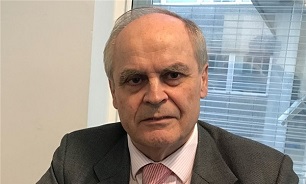UK's Ex-IAEA Envoy: Trump's Claimed Non-Proliferation Concerns for Discarding JCPOA Just Nonsense
 Speaking in an exclusive interview with FNA, Peter Jenkins said Trump's alleged nuclear non-proliferation motive for withdrawing from the Joint Comprehensive Plan of Action (JCPOA) "was and continues to be nonsense".
Speaking in an exclusive interview with FNA, Peter Jenkins said Trump's alleged nuclear non-proliferation motive for withdrawing from the Joint Comprehensive Plan of Action (JCPOA) "was and continues to be nonsense".
"What President Trump demonstrated in May 2018 was either that he is intellectually incapable of understanding what the rest of the world understands or that political and personal considerations matter more to him than upholding and preserving international standards," he added.
Following is the full text of the interview, where Trump's plan for transferring nuclear technology to Saudi Arabia alongside his alleged concerns about Iran's nuclear program has come under discussion with Mr. Jenkins:
Q: Democrats express concern that the Trump administration's plan to allow the Saudi regime access "sensitive US nuclear technology" could enable Riyadh "to produce nuclear weapons and further contribute to the proliferation of nuclear arms throughout an already unstable Middle East." How do you evaluate such concerns?
A: One needs to distinguish between different aspects of the nuclear electricity-generation cycle. Saudi acquisition of light water-moderated reactors (LWRs) for electricity production would not in itself allow Saudi Arabia to produce nuclear weapons. Four such reactors are under construction in the United Arab Emirates (UAE) and no one believes that their acquisition will enable the UAE to produce nuclear weapons. What would justify such a fear would be the sale to Saudi-Arabia (KSA) of technology that could be used to extract plutonium from spent fuel (reprocessing technology) (although LWR spent fuel is less rich in plutonium than spent fuel from heavy water-moderated reactors, like the reactor once planned for construction at Arak in Iran). Even more risky would be the sale to KSA of the technology needed to produce the low-enriched uranium that LWRs burn (uranium enrichment technology). This technology can be used, subject only to the rearrangement of centrifuge cascades, to produce the highly enriched uranium that forms the core of one type of nuclear weapon.
If the sale of reactors to KSA goes through, prudence should require that the sale be accompanied not only by appropriate IAEA safeguards provisions but also by a contractual understanding that KSA will rely on the reactor supplier for reactor fuel, and will return all spent fuel to the supplier.
Q: Do you believe that the Trump administration would allow Saudi Arabia to enrich uranium and reprocessing of plutonium by itself?
A: I think it unlikely that the Trump administration will attempt to persuade the US Congress to allow it to sell uranium or reprocessing technology to KSA. One needs to keep in mind the extraordinary influence over U.S. decision-making currently possessed by the government of Israel. It is hard to conceive of Israel viewing KSA acquisition of enrichment or reprocessing technology as anything less than a threat to Israeli security interests. It is much more likely that Israel will bend every sinew to limit any U.S. sale of nuclear technology to KSA to LWRs.
Of course one needs to have in mind that relations between Israel and KSA are currently much warmer than they have ever been. One has to consider the possibility that KSA leaders will try to persuade Israeli leaders that they would have nothing to fear from KSA acquisition of enrichment and/or reprocessing technology. But the love that binds these two rogue states is not blind. Israeli leaders are still capable of realising that their affair may not last and that the day may come when Saudi hearts are once more cold towards Israel.
Q: In May 2018, Trump withdrew the US from the Iran nuclear agreement for Nuclear Non-Proliferation concerns, while transferring the sensitive US nuclear technology could eventually end up in the acquisition and production of nuclear weapons by Saudi Arabia and trigger nuclear arms race in the Middle East. How could one explain these paradoxical moves?
A: President Trump may have claimed some kind of nuclear non-proliferation motive for withdrawing from the JCPOA, and thereby placing the United States in breach of UN Security Council resolution 2231. But any such claim was and continues to be nonsense. All the other parties to the JCPOA, and an overwhelming number of UN members, see the JCPOA as an agreement that was drawn up to allay concerns about Iran’s commitment to the Nuclear Non-Proliferation Treaty (NPT) and to allow the IAEA to verify that Iran is in full compliance with its NPT obligations. So what President Trump demonstrated in May 2018 was either that he is intellectually incapable of understanding what the rest of the world understands or that political and personal considerations matter more to him than upholding and preserving international standards.
That explains why he might be tempted to sell his KSA friends whatever they want – especially if they are prepared to pay premium prices. However, my guess is that in the end his other close friends, the Israelis, exerting influence directly on administration experts and indirectly through the U.S. Congress, many of whose members rely on pro-Israeli campaign funding, will see to it that this nuclear proliferation risk is averted.
Message end/
